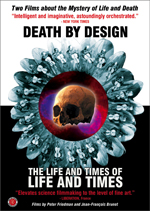 |
Proteus
A film by David Lebrun 60 minutes, Color, English, 2004
|
||||||||||

|
|||||||||||
| Synopsis
For the 19th century, the world beneath the sea played much the same role that outer space played for the 20th. The ocean depths were both the ultimate scientific frontier and the home of imagination and the fantastic. Twenty years in the making and based on images of 19th century painters, photographers and scientific illustrators, Proteus brings these undersea worlds to life in a wonderfully unique film. The central figure of Proteus is biologist and artist Ernst Haeckel. As a young man, Haeckel was torn between science and art, materialism and religion, inner and outer worlds. Through his discoveries beneath the sea, Haeckel reconciled these dualities, bringing them together in an almost mystical vision. His work profoundly influenced not only biology but Art Nouveau and Surrealism, Sigmund Freud and D.H. Lawrence, Vladimir Lenin and Thomas Edison. The key to Haeckel’s vision was a tiny undersea organism called the radiolarian, one of the earliest forms of life. Haeckel discovered and painted four thousand species of these one-celled creatures. In the seemingly infinite variety of their intricate geometric skeletons, Haeckel saw all the possibilities of organic and created form. Around Haeckel’s story, Proteus weaves a tapestry of biology and oceanography, poetry and myth. The legend of Faust and the journey of Coleridge’s Ancient Mariner are part of the story, together with the laying of the transatlantic telegraphic cable and the epic voyage of HMS Challenger. As these threads lead us back to Haeckel and the radiolaria, Proteus becomes “indescribable...a remarkable movie that continually urges the mind to reach beyond what is examined on the screen” (Leonardo: The Journal of Arts, Sciences and Technology). OFFICIAL SELECTION - Sundance Film Festival Reviews "Dazzling!" - LA Weekly "Truly stunning!" - Science Magazine "Thrilling! Brain food that goes down like brain candy." - San Francisco Bay Guardian "A one-of-a-kind visual treat! May cause audiences to look at (and think about) the world around them in dramatically different terms." - Variety "Magnificent...wonderful! Like strolling through a cabinet of wonders." - TV Guide Recommended Reading Art Forms in Nature: The Prints of Ernst Haeckel Art Forms From The Ocean: The Radiolarian Atlas Of 1862 Disc Features ● The Making of Proteus
|
|||||||||||




